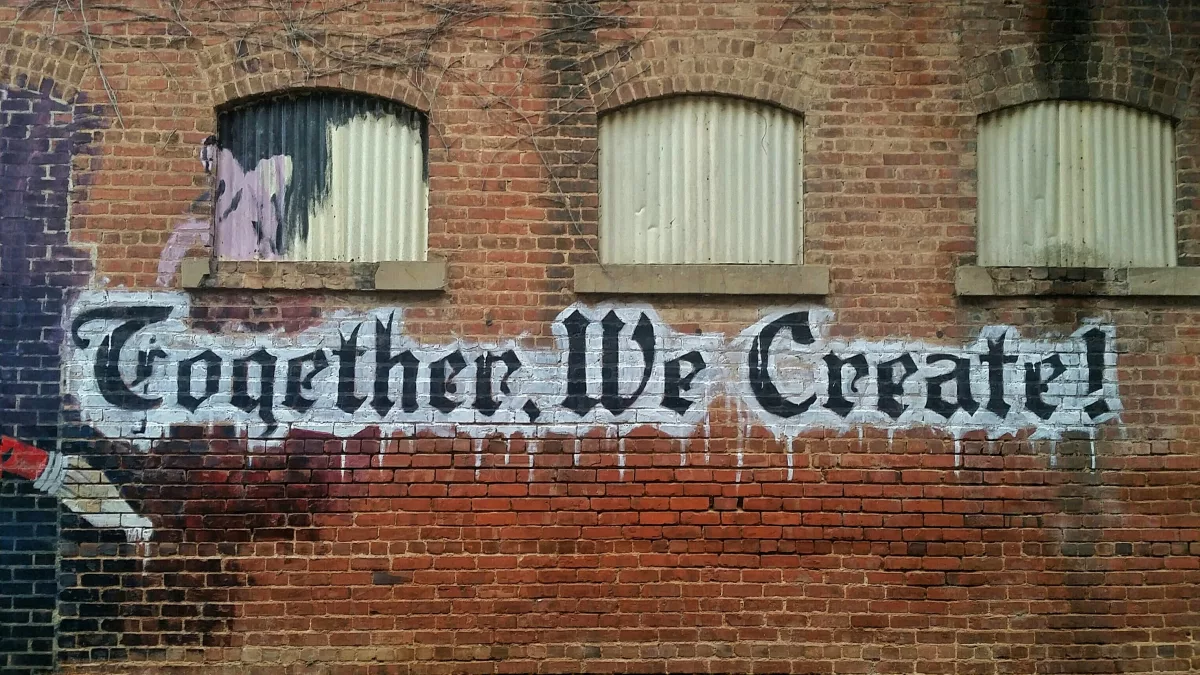I was asked to speak on a panel at a Future of London event at the end of last year. The subject was co-production in the built environment.
I am not feeling co-production.
I am not feeling the built environment.
As in, when I examine my thoughts and feelings on this subject, there is a blank. Given I have been asked to say something, that emptiness will have to change.
The audience was largely council housing officers, planners and developers. That’s the other thing – you have to know your audience and read the room if you want some kind of connection and enlivening dialogue and I do want that.
The event organisers define the topic as:
“Put simply, co-production means a relationship where professionals and citizens sharing power to plan and deliver schemes or services together, such as a successful estate regeneration. Co-production is one way to rethink how we engage with communities – and collaborate with them in a more meaningful way”
My blankness is because I believe co-production is vacuous. A nothing word. Power is not shared. Schemes are not planned together. Engagement is not meaningful. At best it can refer to what we try to do all the time, so why make it something grander than it is? At worst it is a deception and a fraud, claiming to share and care and doing the opposite – a top-down diktat with a bit of PR wrapped around it. To be fair I did say that to the organisers beforehand, so they know what to expect.
If I was to talk to someone on the EL1, 2 or 3 bus about how they’d like to co-produce something, with me, the council, the developer or the NHS, what do you think would happen? The word would mean nothing. Why use words that baffle people? But, if I pushed on and did a bit of translation, I’d still get push back. Usually along the lines of ‘they are just going to do what they always do’. In policy terms, I am being told to eff off.
How do we get to what is real?
I listened to people in the room, I tried to open myself up to what they were saying. I tried to put myself in their shoes. The alternative being to run my own movies on them, going to places I’ve been before in my head and in my day-to-day work.
The question I asked my statutory and private sector participants was: how safe do you feel in your job role, to take risks? Alongside that, how comfortable are you with conflict?
Those questions apply to anyone I work with. I should say, risks and conflict can and maybe should be fun and creative. It doesn’t have to be heavy. A lot of co-production and partnership working is boring, enervating and we should reframe it. It needs disrupting.
Maybe the question I am asking is how does it feel to be you, in your role? Is it safe, can it be dynamic?
The responses I got tended to immediately fix on the limits of what the senior managers and leaders of private and public sector housing and regeneration staff would allow them to do. We hit a limit very quickly. No, there are very definite things I can’t do. No, they don’t allow me to do that. What I understood was that for most staff the need to manage their safety and their relationships internally was far more important than co-production with residents.
The place to start is with what is real for people trying to do co-production. Then we can have a genuine conversation, and then we can take genuine action.
If co-production is about shifting power. It does claim to be that after all. How can you shift power for residents when you can’t empower yourself in your own workplace? If you can’t take risks, you keep having to look upwards to figure out what you are allowed or NOT allowed to do. At its starkest co-production is the authorised lie you have to publicly tell people because you fear for your job. And you fear your bosses more than you fear residents and the community.
There is a difference between words and deeds. There is a difference between strategy and culture. There is a difference between hype and reality. In the workplace there is a difference between what we think and what we say. And residents pick up on that dissonance and reject it in a heartbeat.
That is why only 2% of the population trust developers and 12% of politicians generally. That is why two-thirds of people distrust local councillors and landlords of private housing. (Sources here & here)
If there is this distrust. It is not my distrust. Mori document this year on year in their veracity index, then what is the solution and the action? For me, it is to talk about it, make it visible and, as much as possible, be as open as you possibly can be in actions and words. That vulnerability and candour becomes contagious, in a good way. Co-production is about pretence. What does the opposite look like? Do that.
The other thing a resident said at the event was, rather than trying to play at being developers, shouldn’t councils and housing associations, fulfil their duty of care obligations and just do housing management better, like getting repairs fixed on time and keeping people safe in their homes? Strip it down to the basics, that made a lot of sense.
Thames Life Director

